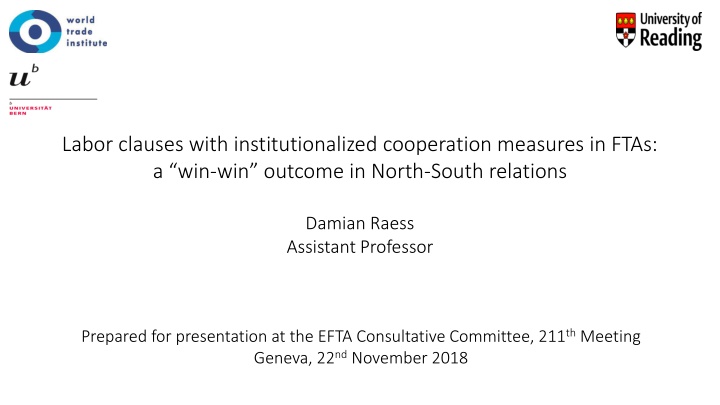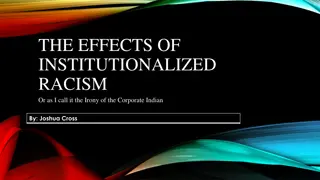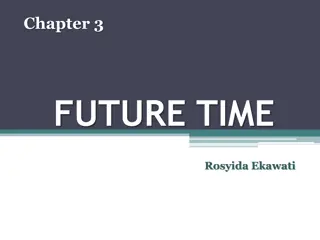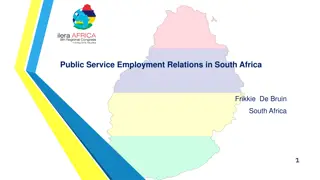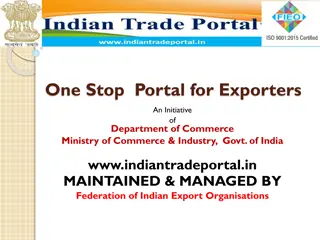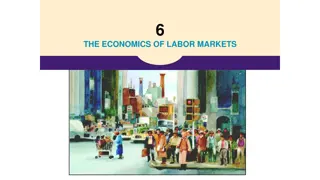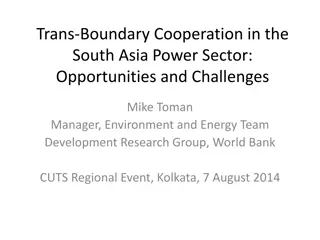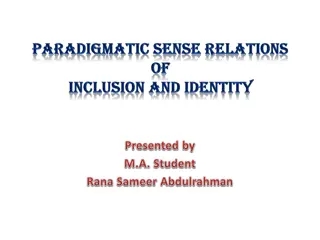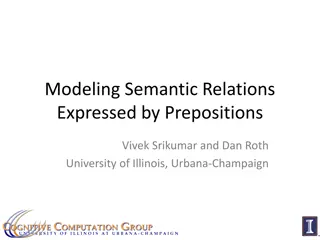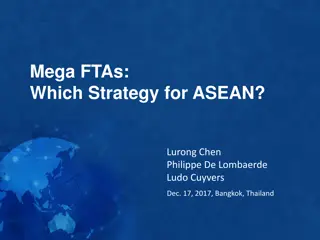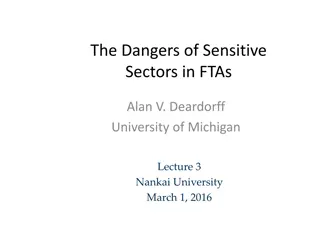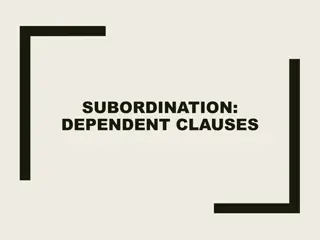Labor Clauses with Institutionalized Cooperation Measures in FTAs: A Win-Win Outcome in North-South Relations
Labor provisions in Free Trade Agreements (FTAs) have been a subject of debate, with key discussions focusing on whether they benefit workers, prevent protectionism, and promote economic development. Research suggests that including labor clauses with institutionalized cooperation measures can have a positive impact on both trade flows and labor rights, especially benefiting low-income countries in North-South agreements.
Uploaded on Sep 07, 2024 | 0 Views
Download Presentation

Please find below an Image/Link to download the presentation.
The content on the website is provided AS IS for your information and personal use only. It may not be sold, licensed, or shared on other websites without obtaining consent from the author.If you encounter any issues during the download, it is possible that the publisher has removed the file from their server.
You are allowed to download the files provided on this website for personal or commercial use, subject to the condition that they are used lawfully. All files are the property of their respective owners.
The content on the website is provided AS IS for your information and personal use only. It may not be sold, licensed, or shared on other websites without obtaining consent from the author.
E N D
Presentation Transcript
Labor clauses with institutionalized cooperation measures in FTAs: a win-win outcome in North-South relations Damian Raess Assistant Professor Prepared for presentation at the EFTA Consultative Committee, 211thMeeting Geneva, 22ndNovember 2018
Outline 1) Impact of labor provisions in FTAs policy implications 2) Review key features of EFTA s TSD chapter in relation to labor issues EFTA - EU comparison 3) Policy recommendations 2
Key debates about trade-labor linkages 1) Are labor provisions protectionism in disguise, designed to reduce trade pressures? 2) Do labor provisions in FTAs make a difference in workers lives? 2 cross-cutting issues: What type of provisions (sanction model Versus cooperation approach) best promote social and economic development? What is the role of social partners in the implementation and monitoring? 3
Preexisting beliefs about trade-labor linkages 1. Protectionism in disguise benefiting high-income countries (Bhagwati 1995) 2. Ineffective in protecting workers (at home and) abroad (e.g., on EU FTA, see Harrison et al. 2018) 3. Only FTAs with strongly enforceable human rights provisions (sanctions model) improve human rights on the ground (Hafner-Burton 2005) 4
Impact of labor provisions on trade flows Study by Carr re, Olarreaga and Raess (2018) Not a priori clear whether labor provisions in FTAs reduce or increase bilateral trade flows Deterioration in comparative advantage of low-income countries? Increase in demand for goods produced with higher labor standards in high- income countries? Key findings: Introduction of labor provisions has on average no impact (all FTAs) Low-income countries benefit from the inclusion of labor provisions in North-South FTAs (boosts exports of low-incoming countries), especially when they include strongly institutionalized cooperation measures 5
Impact of labor provisions on labor rights Study by Raess and Sari (2018b) Freedom of association (FA) and collective bargaining (CB) rights Labour Rights indicators (in law LR and in practice LR) (Kucera and Sari 2018) Key findings: Labor provisions with strongly institutionalized cooperation measures are effective at improving compliance with in law (but not in practice)labor rights Strongly enforceable labor provisions (sanctions model) are not effective 6
Summing-up & policy implications 1) Business case for trade-labor linkages: low-income countries benefit economically from introduction of labor provisions in North-South FTAs, particularly when accompanied by institutionalized cooperation mechanisms Claim that labor provisions amount to hidden protectionism is a myth Low-income countries should not oppose trade-labour linkage 2) High-income countries should not oppose trade-labor linkages either, as more trade is associated with fairer trade, helping to create a level playing field for workers and businesses in high-income countries 7
Summing-up & policy implications (continued) 3) Labor clauses with institutionalized cooperation measures are a win-win outcome in North-South FTAs. Design of such clauses: a. specialized committee in charge of implementation (Labour Affairs council) b. involvement of third parties (social partners, NGOs, ILO) 4) Model with sanctions appears to be sub-optimal Adjudication based model (tit-for-tat) and threat of sanctions is inadequate (unfavorable) in tackling complex labor related issues 8
Labour Provisions in PTAs (LABPTA) dataset (Raess and Sari 2018a) Covers 487 FTAs and 165 countries over 1990-2015 Aspirational statements regarding labour-related commitments in the Preamble or Objectives part of the agreement International LS (e.g. ILO 1998 Declaration; ILO core conventions etc.) Domestic LS (non-derogation, effective enforcement; access to domestic courts) Bindingness and the extent of obligations established through careful legal analysis (wording such as shall, will etc.) Political DSM (no 3rd party adjudication) Quasi-Judicial DSM (arbitration) Judicial DSM (judicial adjudication) Sanctions (consensual and unilateral sanctions) International LS (see Substance) Domestic LS (See Substance) Committee (regular or separate) Operation (regular or ad hoc); rank of participants (high or low) Third party involvement (social partners, ILO, NGOs, etc.) Means of cooperation (exchange of info or people, technical assistance/capacity building) I. I. Preambular Preambular Provisions (P) Provisions (P) II. II. Substance Substance Provisions (S) Provisions (S) III. III. Obligation Obligation Provisions (O) Provisions (O) IV. IV. Enforcement Enforcement Provisions (E) Provisions (E) V. V. Cooperation Cooperation Provisions (C) Provisions (C) VI. VI. Institutions Institutions Provisions (I) Provisions (I) 9
Substance EFTA Montenegro_ 2011 Bosnia and Herzegovina EFTA_2013 Costa Rica Panama EFTA_2013 EFTA Philippines_ 2016 EC Colombia EFTA_2008 EFTA Peru_2010 EFTA Hong Kong_2011 1 1 1 1 1 1 1 1 1 1 Korea_2010 1 Improve working conditions 2 Other labour rights 3 ILO 1998 Declaration on Fundamental Principles and Rights at Work 4 Freedom of association and protection of the right to organise and strike (including ILO Convention No. 87) 5 Effective recognition of the right to collective bargaining (including ILO Convention No. 98) 6 Elimination of all forms of forced or compulsory labour (including ILO Convention Nos. 29 and 105) 7 Setting minimum age for admission to employment (including ILO Convention No. 138) 8 Prohibition and elimination of the worst forms of child labour (including ILO Convention No. 182) 9 Equal remuneration for men and women for work of equal value (including ILO Convention No. 100) 10 Elimination of discrimination in respect of employment and occupation (including ILO Convention No. 111) 11 Conditions of work 12 Conditions of work / working time 13 Conditions of work / wages 14 Conditions of work / health and safety 15 ILO 2008 Declaration on Social Justice for a Fair Globalization 16 Decent Work 17 Internationally recognised labour standards (incl. general ref. to ILO Conventions) 18 UN ECOSOC Ministerial Declaration on Full and Productive Employment and Decent Work for All 2006 19 Corporate Social Responsibility 20 Non-derogation 21 Effective enforcement of domestic laws 22 Access to domestic courts amb ular Pre 1 1 1 1 1 1 1 1 1 1 1 1 1 1 1 1 1 1 1 1 1 1 1 1 1 1 1 1 1 1 1 1 1 1 1 1 1 1 1 1 1 1 1 1 1 1 Substance 1 1 1 1 1 1 1 1 1 1 1 1 1 1 1 1 1 1 1 1 1 1 1 1 1 1 1 1 1
Obligation EFTA Montenegro_ 2011 Bosnia and Herzegovina EFTA_2013 Costa Rica Panama EFTA_2013 EFTA Philippines_ 2016 Colombia EFTA_2008 EFTA Peru_2010 EFTA Hong Kong_2011 EC Korea_2010 1 1 1 1 1 1 1 1 23 ILO 1998 Declaration on Fundamental Principles and Rights at Work 24 Freedom of association and protection of the right to organise and strike (including ILO Convention No. 87) 25 Effective recognition of the right to collective bargaining (including ILO Convention No. 98) 26 Elimination of all forms of forced or compulsory labour (including ILO Convention Nos. 29 and 105) 27 Setting minimum age for admission to employment (including ILO Convention No. 138) 28 Prohibition and elimination of the worst forms of child labour (including ILO Convention No. 182) 29 Equal remuneration for men and women for work of equal value (including ILO Convention No. 100) 30 Elimination of discrimination in respect of employment and occupation (including ILO Convention No. 111) 31 Conditions of work 32 Conditions of work/working time 33 Conditions of work/wages 34 Conditions of work/health and safety 35 ILO 2008 Declaration on Social Justice for a Fair Globalization 36 Decent Work 37 Internationally recognised labour standards (incl. general ref. to ILO Conventions) 38 UN ECOSOC Ministerial Declaration on Full and Productive Employment and Decent Work for All 2006 39 Corporate Social Responsibility 40 Non-derogation 41 Effective enforcement of domestic laws 42 Access to domestic courts Obligation 1 1 1 1 1 1 1 1 1 1 1 1
Costa Rica Panama EFTA 2013 ARTICLE 9.5 International Labour Standards and Agreements 1. The Parties, in accordance with their obligations as members of the ILO, reaffirm their commitments to respect, promote and realise, the principles concerning the fundamental rights, contained in the ILO Declaration on Fundamental Principles and Rights at Work and its Follow-up adopted by the International Labour Conference at its 86th Session in 1998, namely: (a) freedom of association and the effective recognition of the right to collective bargaining; (b) 3. The Parties recall the obligations as members of the ILO to effectively implement, in accordance with the ILO Declaration on Fundamental Principles and Rights at Work of 1998, the ILO Fundamental Conventions which they have ratified and to make continued and sustained efforts towards ratifying the fundamental ILO Conventions. The Parties will exchange information on the respective situation and advancements as regards the other ILO Conventions. EC Korea 2010 Article 13.4 3. The Parties, in accordance with the obligations deriving from membership of the ILO and the ILO Declaration on Fundamental Principles and Rights at Work and its Follow-up, adopted by the International Labour Conference at its 86th Session in 1998, commit to respecting, promoting and realising, in their laws and practices, the principles concerning the fundamental rights, namely: (a) freedom of association and the effective recognition of the right to collective bargaining; (b) The Parties reaffirm the commitment to effectively implementing the ILO Conventions that Korea and the Member States of the European Union have ratified respectively. The Parties will make continued and sustained efforts towards ratifying the fundamental ILO Conventions as well as the other Conventions that are classified as up-to-date by the ILO. Obligation 12
Enforceability EFTA Montenegro_ 2011 1 1 1 1 1 1 1 1 Bosnia and Herzegovina EFTA_2013 1 1 1 1 1 1 1 1 Costa Rica Panama EFTA_2013 EFTA Philippines_ 2016 1 1 1 Colombia EFTA_2008 EFTA Peru_2010 EFTA Hong Kong_2011 1 EC Korea_2010 1 1 1 1 1 1 1 1 43 ILO 1998 Declaration on Fundamental Principles and Rights at Work 44 Freedom of association and protection of the right to organise and strike (including ILO Convention No. 87) 45 Effective recognition of the right to collective bargaining (including ILO Convention No. 98) 46 Elimination of all forms of forced or compulsory labour (including ILO Convention Nos. 29 and 105) 47 Setting minimum age for admission to employment (including ILO Convention No. 138) 48 Prohibition and elimination of the worst forms of child labour (including ILO Convention No. 182) 49 Equal remuneration for men and women for work of equal value (including ILO Convention No. 100) 50 Elimination of discrimination in respect of employment and occupation (including ILO Convention No. 111) 51 Conditions of work 52 Conditions of work/working time 53 Conditions of work/wages 54 Conditions of work/health and safety 55 ILO 2008 Declaration on Social Justice for a Fair Globalization 56 Decent Work 57 Internationally recognised labour standards (incl. general ref. to ILO Conventions) 58 UN ECOSOC Ministerial Declaration on Full and Productive Employment and Decent Work for All 2006 59 Corporate Social Responsibility 60 Non-derogation 61 Effective enforcement of domestic laws 62 Access to domestic courts 1 1 1 1 1 1 1 1 P_DSM 1 1 1 1 1 1 1 1 1 1 1 1 1 1 1 1 1 1 1 1 1 1 1 1 1 1 1 1 1
Enforceability EFTA Montenegro_ 2011 Bosnia and Herzegovina EFTA_2013 Costa Rica Panama EFTA_2013 EFTA Philippines_ 2016 EC Colombia EFTA_2008 EFTA Peru_2010 EFTA Hong Kong_2011 Korea_2010 1 1 1 1 1 1 1 1 63 ILO 1998 Declaration on Fundamental Principles and Rights at Work 64 Freedom of association and protection of the right to organise and strike (including ILO Convention No. 87) 65 Effective recognition of the right to collective bargaining (including ILO Convention No. 98) 66 Elimination of all forms of forced or compulsory labour (including ILO Convention Nos. 29 and 105) 67 Setting minimum age for admission to employment (including ILO Convention No. 138) 68 Prohibition and elimination of the worst forms of child labour (including ILO Convention No. 182) 69 Equal remuneration for men and women for work of equal value (including ILO Convention No. 100) 70 Elimination of discrimination in respect of employment and occupation (including ILO Convention No. 111) 71 Conditions of work 72 Conditions of work/working time 73 Conditions of work/wages 74 Conditions of work/health and safety 75 ILO 2008 Declaration on Social Justice for a Fair Globalization 76 Decent Work 77 Internationally recognised labour standards (incl. general ref. to ILO Conventions) 78 UN ECOSOC Ministerial Declaration on Full and Productive Employment and Decent Work for All 2006 79 Corporate Social Responsibility 80 Non-derogation 81 Effective enforcement of domestic laws 82 Access to domestic courts QJ-DSM 1 1 1 1
Cooperation EFTA Montenegro_ 2011 Bosnia and Herzegovina EFTA_2013 Costa Rica Panama EFTA_2013 EFTA Philippines_ 2016 Colombia EFTA_2008 EFTA Peru_2010 EFTA Hong Kong_2011 EC Korea_2010 1 107 Exchange of information 108 Exchange of people, including study visits, joint research, seminars and workshops 109 Technical assistance, capacity building 110 ILO 1998 Declaration on Fundamental Principles and Rights at Work 111 Freedom of association and protection of the right to organise and strike (including ILO Convention No. 87) 112 Effective recognition of the right to collective bargaining (including ILO Convention No. 98) 113 Elimination of all forms of forced or compulsory labour (including ILO Convention Nos. 29 and 105) 114 Setting minimum age for admission to employment (including ILO Convention No. 138) 115 Prohibition and elimination of the worst forms of child labour (including ILO Convention No. 182) 116 Equal remuneration for men and women for work of equal value (including ILO Convention No. 100) 117 Elimination of discrimination in respect of employment and occupation (including ILO Convention No. 111) 118 Conditions of work 119 Conditions of work/working time 120 Conditions of work/wages 121 Conditions of work/health and safety 122 ILO 2008 Declaration on Social Justice for a Fair Globalization 123 Decent Work 124 Internationally recognised labour standards (incl. general ref. to ILO Conventions) 125 Labour laws 126 UN ECOSOC Ministerial Declaration on Full and Productive Employment and Decent Work for All 2006 127 Corporate Social Responsibility 128 Industrial relations, social dialogue 129 Labour administration and inspection 130 Gender equality 1 1 1 1 1 1 1 1 1 1 1 Cooperation 1 1 1 1 1 1 1 1
Institution EFTA Montenegro_ 2011 1 1 Bosnia and Herzegovina EFTA_2013 Costa Rica Panama EFTA_2013 EFTA Philippines_ 2016 1 1 Colombia EFTA_2008 EFTA Peru_2010 EFTA Hong Kong_2011 EC Korea_2010 1 1 131 Regular 132 Separate 133 Regular 134 Ad hoc 135 High rank 136 Low rank 137 Social partners 138 ILO 139 NGOs 140 Other third party 1 1 1 1 1 1 1 1 Institution 1 1 1 1 1 1 1 Does the agreement require states to prepare a labor impact assessment of the PTA? 1 1 1 1 1 Enforceability (Non binding / best efforts (0), binding with no D/S (1), binding with state-to-state D/S (2), binding with private D/S (3)) 1 1 1 1 1 # provisions 1 1 20 37 33 40 29 72
EFTA Philippines 2016 Art. 11.10 Implementation and Consultations 1. The parties shall designate the administrative entities, which shall serve as contact points for the purposes of implementing this Chapter. 2. A Party may, through the contact points, request expert consultations or consultations within the Joint Committee regarding any matter under this Chapter. The Parties shall make every attempt to arrive at a mutually acceptable solution of the matter. Where relevant, subject to the agreement of the Parties, they can seek advice of the relevant international organizations or bodies. EC Korea 2010 Article 13.12 Institutional mechanism 1. Each Party shall designate an office within its administration which shall serve as a contact point with the other Party for the purpose of implementing this Chapter. 2. The Committee on Trade and Sustainable Development established pursuant to Article 15.2.1 (Specialised Committees) shall comprise senior officials from within the administrations of the Parties. 3. The Committee shall meet within the first year of the entry into force of this Agreement, and thereafter as necessary, to oversee the implementation of this Chapter, including cooperative activities undertaken under Annex 13. 4. Each Party shall establish a Domestic Advisory Group(s) on sustainable development (environment and labour) with the task of advising on the implementation of this Chapter. 5. The Domestic Advisory Group(s) comprise(s) independent representative organisations of civil society in a balanced representation of environment, labour and business organisations as well as other relevant stakeholders. Article 13.13 Civil society dialogue mechanism 1. Members of Domestic Advisory Group(s) of each Party will meet at a Civil Society Forum in order to conduct a dialogue encompassing sustainable development aspects of trade relations between the Parties. The Civil Society Forum will meet once a year unless otherwise agreed by the Parties. Institution 17
Institution - Review mechanism EFTA Philippines 2016 Art. 11.11 This Chapter shall be subject to periodic review within the framework of the Joint Committee. The Parties shall discuss progress achieved in pursuing the objectives set out in this Chapter and consider relevant international developments in order to identify areas where further action could promote these objectives. Canada EC (CETA) 2016 Art. 22.3 The Parties recognise the importance of addressing specific sustainable development issues by assessing the potential economic, social and environmental impacts of possible actions, taking account of the views of stakeholders. Therefore, each Party commits to review, monitor and assess the impact of the implementation of this Agreement on sustainable development in its territory in order to identify any need for actionthat may arise in connection with this Agreement. The Parties may carry out joint assessments. These assessments will be conducted in a manner that is adapted to the practices and conditions of each party, through the respective participative processes of the Parties, as well as those processes set up under this Agreement. 18
Recent development at EU level Debate on and reform of EU TSD chapter (February 2018) Background: dissatisfaction regarding effective enforcement of SD provisions (lack of political will and weak implementation and monitoring) Lack of consensus on introduction of sanctions 15-point plan to step up and improve implementation More assertive enforcement Facilitate monitoring role of civil society organizations Make resources available to support implementation Regular review of effectiveness of TSD implementation 19
Assessing EFTAs TSD chapter Summary statement: FTAs that are hortatory, or substantive but lacking in strong institutions and enforcement mechanisms, are unlikely to have much impact on worker rights But neither does the mere presence of those mechanisms guarantee improvements in worker rights The mechanisms have to be credible and countries have to be willing to use them EU passes the test, especially the revamped approach since 2018 Where does EFTA s approach to trade-labor linkage stand? 20
Assessing EFTAs TSD chapter (continued) Institutional set-up for overseeing the implementation and monitoring of SD chapters is weak No dedicated subcommittee dealing with labor/sustainability issues Do not enable civil society organizations to perform monitoring functions Active monitoring of implementation of SD chapters appears to be lacking Joint committees don t seem to actively act upon SD issues Periodic review is still wanting overhaul of the SD chapter, especially institutional provisions 21
Policy recommendations 1) Approach based on dialogue and cooperation is the right one, but an overhaul of institutional set-up is needed creation subcommittee for sustainability issues active involvement of social partners 2) Compulsory, regular and inclusive review and impact assessment 3) Step up resources 4) Select partner countries for enhanced cooperation based on: a) Severity of violations of Fundamental ILO Conventions in partner countries b) Volume of trade c) Coordinate with key actors sharing the same approach (EU, New Zealand) ( observatory status in each others domestic advisory groups where trade partners overlap?) 22
Policy recommendations (continued) 5) Bindingness. Revise treaty text of TSD chapter to ensure commitments are legally binding (see above point under Obligation ) 6) Scope commitments. Broaden the scope to include commitments to promote Responsible Business Conduct by referring to internationally agreed instruments 7) Dispute settlement. Consider introducing a two-stage process regarding dispute settlement (possibility to establish panel of experts who issue recommendations) 8) From compliance to commitment approach, remember, it is a win-win!!! The global context (UN SD agenda; rise of protectionism) requires it more than ever. 23
A Social Clause through the Back Door? Labour Provisions in Preferential Trade Agreements Two-year project (Nov. 2014 Oct. 2016) funded by the Swiss Network of International Studies https://snis.ch/project/social-clause-through-back-door/ PRINCIPAL MEMBERS Dora Sari Myriam Oehri Sonja Peters(RA) Damian Raess/Coordinator ASSOCIATED MEMBERS Andreas D r Marcelo Olarreaga C line Carr re Joost Pauwelyn C dric Dupont David Kucera Martin Myant Jos Corpataux 24
References Carr re, C., Olarreaga, M. and Raess, D. (2018) Labor Clauses in Trade Agreements: worker protection or protectionism?, October (available on request) Hafner-Burton, E. (2005) Trading Human Rights: How Preferential Trade Agreements Influence Government Repression, International Organization 59: 593-629. Harrison et al. (2018) Labor Standards Provisions in EU Free Trade Agreements: Reflections on the European Commission s Reform Agenda , World Trade Review (published online 2 August) Kucera, D. and Sari, D. (2018) New Labour Rights Indicators: Method and Trends for 2000-2015, International Labour Review Raess, D. and Sari, D. (2018a) Labor Provisions in Trade Agreements (LABPTA): Introducing a New Dataset, Global Policy 9(4): 451-466. Raess, D. and Sari, D. (2018a) Do labor provisions in PTAs reduce labor rights violations? The role of institutionalized cooperation, August (available upon request) 25
